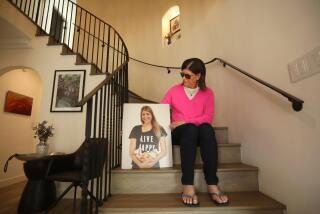After the Smoke Clears, Regrets
As a high school cheerleader, athlete, nurse’s assistant and life insurance agent, Betty Bullock was surrounded by the danger signs of smoking for most of her life.
The 64-year-old Newport Beach grandmother, who is dying of lung cancer, won a record $28-billion jury award from the Philip Morris Cos. on Friday, an award that is sure to be appealed beyond Bullock’s expected life span now that the cancer has spread to her liver.
Family members and Bullock’s attorney said she was not available for an interview, but her life story as a smoker emerges in hundreds of pages of court testimony and depositions.
Bullock, who for much of her adult life smoked two packs a day, picked up the habit as a high school senior. She said she was attracted by advertisements depicting “romantic couples” who looked like Elizabeth Taylor and Clark Gable puffing away.
After graduation, Bullock left her native South Dakota to pursue golden dreams in the Golden State. But those dreams eventually faded through two divorces, a series of jobs that included changing the diapers of seniors in nursing homes and now what is described as a terminal illness.
Over the last two decades, Bullock suffered though repeated emergency-room trips and hospital admissions because of severe bronchitis and pneumonia. Her doctors suggested that she reduce smoking the Benson & Hedges cigarettes she kept in her purse.
But pulling a smoke out of her purse was an old habit.
In one deposition, Bullock described how she would ask for breaks during her job as a data processor at UC Irvine to “run downstairs” and polish off a third of a cigarette before having to hurry back to work.
At another point, when Bullock worked for a grocer, she enraged fellow employees by dumping cigarette ashes into a wastebasket, causing a fire.
Asked by a Philip Morris attorney whether she knew before her diagnosis that smoking caused lung cancer and other deadly diseases, Bullock answered: “I thought all kinds of controversy on it. I would read the little clip in the paper here or there. Some medical studies were stating such that they felt that it could.
“But then I’d see things Philip Morris would say like that’s just statistics, there is no medical proof. Our No. 1 concern is our customers, and we protect their health and there wasn’t any health risks,” Bullock said in a deposition.
During the trial, Philip Morris attorney Peter Bleakley told jurors that Bullock didn’t try to quit until 1998. She was diagnosed with lung cancer in February 2001. Bullock also smoked other Philip Morris brands, including Marlboros and L&M; cigarettes.
An active and popular student at her Watertown, S.D., high school, Bullock was voted Sweetheart of the Year by the boys. She was a cheerleader, active in drama and a member of the gymnastics club. While in high school, Bullock hatched a plan to move to Southern California, arriving in Los Angeles in 1956.
She landed a job at the Cannon Electric plant, enrolled in Pasadena City College and found her high school boyfriend, Phil Wulff, who also had moved to Southern California.
They married in 1960, settling in South Dakota where Bullock’s daughter, Jodie Goldstein, was born.
But working two jobs--as a data processor and a waitress, as well as caring for Wulff’s ill father--turned out to be too much stress on the marriage. The couple divorced and Bullock headed back to California, settling in Downey with Jodie.
It was during this time that Jodie started to pester her mother about the smoking habit, telling her that it “smelled bad” and made the house “icky,” according to court records.
Throughout her school years, and even after, Jodie tried to get her mother to stop smoking, often “nagging” her and pointing out how it made Bullock cough.
Jodie didn’t like what the smoking was doing to her mother, at one point telling Bullock: “I want to be skiing with you and ice skating
Bullock remarried in 1963. Marvin Bullock also was a two-pack-a-day smoker. The marriage lasted 15 years, and Marvin Bullock died of complications from emphysema and bleeding ulcers in 1994.
On her own once again after the divorce, Bullock tried her hand at the insurance business, taking a two-week prep course for a test to become an agent. She flunked, but took more review courses, eventually passed and for a brief stint sold life insurance.
However, that job ended after six months and Bullock once again was looking for another career. This time, she took classes at a hospital and a regional occupational center to become a certified nurse’s assistant. During this period, Bullock accepted a job at a nursing home, changing adult diapers, emptying bedpans and helping seniors take showers--”kind of the dirty work,” Bullock recalled. The experience helped her gain her assistant’s license.
Bullock liked the work, but it was arduous. She often worked 60 to 70 hours a week and sometimes provided 24-hour care for her patients.
Meanwhile, Bullock’s health continued to deteriorate. She tried to quit smoking several times, seeking help from hypnotism, nicotine gum and patches. Nothing worked. At the same time, Bullock acknowledged that smoking was enjoyable--”social”--and that she liked a smoke with a good meal.
Later she learned that she had cancer. And in her deposition she broke down, regretting the turn of events. “I was thinking that I was in my teens and they were selling me these, this poison and this addictive and brain-altering drug,” Bullock said. “I was robbed terribly, probably 20 years of my life being with my only grandchild that’s a baby and my daughter who has no sisters or brothers so she needs me.”
More to Read
Sign up for Essential California
The most important California stories and recommendations in your inbox every morning.
You may occasionally receive promotional content from the Los Angeles Times.











